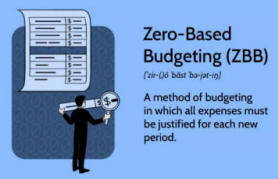 |
Introduce Zero-Based Budgeting
|
In management accounting, when a budget is prepared from scratch with its base as zero, it is called Zero-Based Budgeting (ZBB). It promises to move organizations away from incremental budgeting, where last year’s budget is the starting point for the next. Instead, the starting point becomes zero, with the implication that past patterns of spending are no longer taken as a given. Essentially it is a method of budgeting in which all expenses must be justified for each new period.
During the traditional budgeting process, managers often view it as a bit of a contest to ensure their department has the largest budget possible, as this is often seen as a sign of the importance of their area. Zero-based budgeting forces managers to understand the cash flows and expenditures of their department and to be able to articulate why their department should be funded to a particular level in the context of the organization's goals and objectives.
|
Zero-based budgeting is a concept where the budget for the next budgeting cycle for an organization, starts from a zero base as opposed to an increase of the current spending levels. Under this process, the budget amount for a department must be justified both in terms of the purpose of the budget and the amount to be included in the budget. . Roger Wohlner |
Council should develop a policy directing that any budget increase from the previous year be accompanied with an offset from another area. As well, any changes made cannot have an adverse impact on the delivery or quality of services.